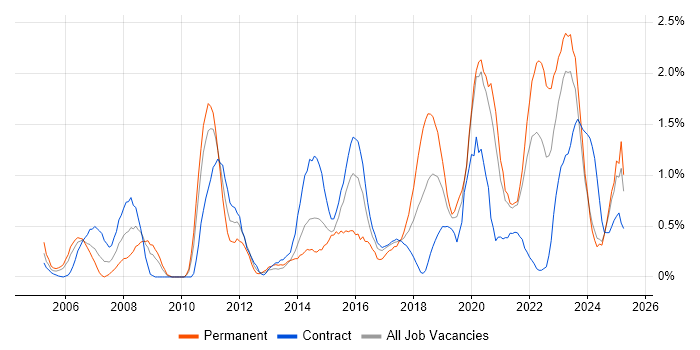Data Structures
Tyne and Wear > Newcastle upon Tyne
The table below looks at the prevalence of the term Data Structures in permanent job vacancies in Newcastle upon Tyne. Included is a benchmarking guide to the salaries offered in vacancies that cited Data Structures over the 6 months leading up to 16 May 2025, comparing them to the same period in the previous two years.
| 6 months to 16 May 2025 |
Same period 2024 | Same period 2023 | |
|---|---|---|---|
| Rank | 41 | 80 | 73 |
| Rank change year-on-year | +39 | -7 | -14 |
| Permanent jobs citing Data Structures | 6 | 3 | 13 |
| As % of all permanent jobs advertised in Newcastle upon Tyne | 1.87% | 0.29% | 1.70% |
| As % of the Miscellaneous category | 5.36% | 0.95% | 4.41% |
| Number of salaries quoted | 6 | 3 | 13 |
| 10th Percentile | £42,125 | - | £37,587 |
| 25th Percentile | £63,438 | £42,500 | £43,500 |
| Median annual salary (50th Percentile) | £103,750 | £45,000 | £47,672 |
| Median % change year-on-year | +130.56% | -5.60% | -43.92% |
| 75th Percentile | £122,500 | £47,500 | £52,000 |
| 90th Percentile | - | - | £67,500 |
| Tyne and Wear median annual salary | £103,750 | £71,500 | £47,672 |
| % change year-on-year | +45.10% | +49.98% | -43.92% |
All Generic Skills
Newcastle upon Tyne
Data Structures falls under the General and Transferable Skills category. For comparison with the information above, the following table provides summary statistics for all permanent job vacancies requiring generic IT skills in Newcastle upon Tyne.
| Permanent vacancies with a requirement for generic IT skills | 112 | 315 | 295 |
| As % of all permanent jobs advertised in Newcastle upon Tyne | 34.89% | 30.73% | 38.61% |
| Number of salaries quoted | 72 | 256 | 107 |
| 10th Percentile | £35,000 | £31,250 | £34,650 |
| 25th Percentile | £44,188 | £36,438 | £43,162 |
| Median annual salary (50th Percentile) | £58,750 | £47,500 | £55,000 |
| Median % change year-on-year | +23.68% | -13.64% | +10.00% |
| 75th Percentile | £70,000 | £67,968 | £68,750 |
| 90th Percentile | £85,000 | £80,000 | £79,250 |
| Tyne and Wear median annual salary | £55,000 | £47,750 | £55,000 |
| % change year-on-year | +15.18% | -13.18% | +15.79% |
Data Structures
Job Vacancy Trend in Newcastle upon Tyne
Job postings citing Data Structures as a proportion of all IT jobs advertised in Newcastle upon Tyne.

Data Structures
Salary Trend in Newcastle upon Tyne
3-month moving average salary quoted in jobs citing Data Structures in Newcastle upon Tyne.
Data Structures
Salary Histogram in Newcastle upon Tyne
Salary distribution for jobs citing Data Structures in Newcastle upon Tyne over the 6 months to 16 May 2025.
Data Structures
Co-occurring Skills and Capabilities in Newcastle upon Tyne by Category
The follow tables expand on the table above by listing co-occurrences grouped by category. The same employment type, locality and period is covered with up to 20 co-occurrences shown in each of the following categories:
